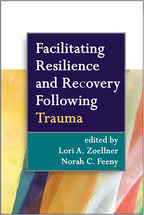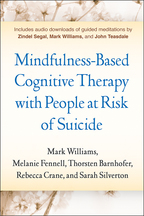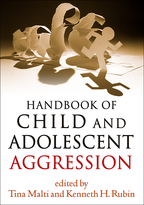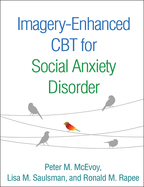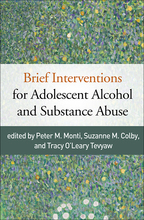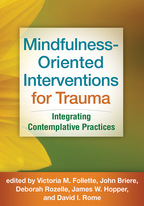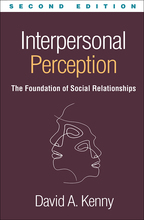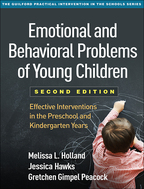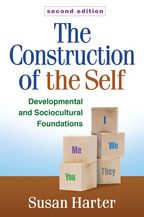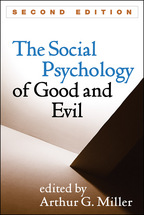Facilitating Resilience and Recovery Following Trauma
Edited by Lori A. Zoellner and Norah C. Feeny
Hardcovere-bookprint + e-book
Hardcover
orderJanuary 21, 2014
ISBN 9781462513505
Price: $51.00 346 Pages
Size: 6" x 9"
Sign up for emails on upcoming titles on Trauma & PTSD (with special discounts)!
“Zoellner and Feeny's work represents the first comprehensive text on the subject of resilience and recovery following trauma, bringing together leading authorities in their respective fields; to those familiar with the trauma literature, a quick glance of the list of authors will reveal several recognizable names. It is a significant contribution to the field of trauma psychology in both its breadth and depth of coverage of the existing literature….A notable strength of the entire work is its grounding in empirical research-each chapter presents a scholarly review of the latest research within its area of focus that is detailed enough to include critical discussions of key findings in specific studies as well as promising scales and instruments that have implications for use in both clinical and research settings. Even so, the text is written in a manner that is remarkably accessible, with special attention placed on integrating research findings with real-world clinical examples, leading to practical clinical recommendations for fostering resilience and recovery. Although the target audience appears to be mental health clinicians, this book would also be appropriate for graduate students (with or without a clinical training focus).”

—PsycCritiques
“This book is likely to be characterized by readers as hopeful and optimistic with an emphasis on individual strengths versus vulnerabilities. Interest in select chapters may extend beyond the professional community to members of the general public, including trauma victims and their loved ones….Facilitating Resilience and Recovery Following Traumaprovides an optimal balance of theory, research, and practice. All chapters include relevant case examples along with take-home recommendations for conceptualizing trauma symptom development, expression, maintenance, and remission….All of the chapters are well-written and offer extensive citations in their comprehensive reviews of the respective literature. The book would seem to be essential reading for researchers, practitioners, and even loved-ones wishing to address a balance of victim strengths, as well as vulnerabilities, in their efforts to cope with traumatic experiences that are often unimaginable.”

—Journal of Contemporary Psychotherapy
“This volume brings together leading authorities in their respective topics. It is uniquely valuable in focusing on trauma survivors' resilience rather than their pathology. The book helps clinicians and researchers better understand the potentially modifiable risk and resilience factors that shape recovery. It identifies empirically supported principles that elucidate the often bewildering complexity of multiple problems and diagnoses commonly experienced by trauma survivors. Clinical recommendations are included in each chapter. Strongly recommended!”

—Josef I. Ruzek, PhD, Director, Dissemination and Training Division, National Center for PTSD, VA Palo Alto Health Care System
“What distinguishes this book from many other volumes on trauma is the message of hope. Zoellner and Feeny are to be congratulated. An international who's who in trauma focuses on how to foster resilience following trauma, a goal we all need to emphasize for our patients, our students, and ourselves. With rich clinical material, the contributors cover the gamut from children to military personnel, acute interventions to dissociation and pain. A 'must read' for clinicians and graduate students who wish to stay abreast of the latest thinking on trauma and recovery.”

—Barbara Olasov Rothbaum, PhD, ABPP, Professor of Psychiatry, and Director, Emory Healthcare Veterans Program and Trauma and Anxiety Recovery Program, Emory University School of Medicine
“In recent years, greater attention has been paid to resilience among trauma survivors, which turns out to be more common than expected. Zoellner and Feeney have assembled a distinguished group of trauma scholars to share their perspectives on risk and resilience at the individual level, in the context of interpersonal relationships, and within the larger social fabric. Poignant, inspiring examples head many chapters and illustrate the ways that people recover on their own, even when risk factors are present. For those who are not initially resilient or do not recover naturally, the book shows how healing can be facilitated by modern interventions. This book provides a scholarly overview of what we know so far and points the way to what we need to learn.”

—Lucy Berliner, MSW, Director, Harborview Center for Sexual Assault and Traumatic Stress, University of Washington
“This book does an exceptional job of clarifying the commonly confused concepts of resilience and recovery in the wake of trauma. It advances our field by focusing on common factors that consistently have been shown to facilitate resilience and recovery. This approach gives us a better understanding of the trauma recovery process and simplifies what might be done to help survivors. Clinicians, early interventionists, first responders, and policymakers will all profit from having this book on hand.”

—Candice M. Monson, PhD, Department of Psychology, Toronto Metropolitan University, Canada
—PsycCritiques
“This book is likely to be characterized by readers as hopeful and optimistic with an emphasis on individual strengths versus vulnerabilities. Interest in select chapters may extend beyond the professional community to members of the general public, including trauma victims and their loved ones….Facilitating Resilience and Recovery Following Traumaprovides an optimal balance of theory, research, and practice. All chapters include relevant case examples along with take-home recommendations for conceptualizing trauma symptom development, expression, maintenance, and remission….All of the chapters are well-written and offer extensive citations in their comprehensive reviews of the respective literature. The book would seem to be essential reading for researchers, practitioners, and even loved-ones wishing to address a balance of victim strengths, as well as vulnerabilities, in their efforts to cope with traumatic experiences that are often unimaginable.”
—Journal of Contemporary Psychotherapy
“This volume brings together leading authorities in their respective topics. It is uniquely valuable in focusing on trauma survivors' resilience rather than their pathology. The book helps clinicians and researchers better understand the potentially modifiable risk and resilience factors that shape recovery. It identifies empirically supported principles that elucidate the often bewildering complexity of multiple problems and diagnoses commonly experienced by trauma survivors. Clinical recommendations are included in each chapter. Strongly recommended!”
—Josef I. Ruzek, PhD, Director, Dissemination and Training Division, National Center for PTSD, VA Palo Alto Health Care System
“What distinguishes this book from many other volumes on trauma is the message of hope. Zoellner and Feeny are to be congratulated. An international who's who in trauma focuses on how to foster resilience following trauma, a goal we all need to emphasize for our patients, our students, and ourselves. With rich clinical material, the contributors cover the gamut from children to military personnel, acute interventions to dissociation and pain. A 'must read' for clinicians and graduate students who wish to stay abreast of the latest thinking on trauma and recovery.”
—Barbara Olasov Rothbaum, PhD, ABPP, Professor of Psychiatry, and Director, Emory Healthcare Veterans Program and Trauma and Anxiety Recovery Program, Emory University School of Medicine
“In recent years, greater attention has been paid to resilience among trauma survivors, which turns out to be more common than expected. Zoellner and Feeney have assembled a distinguished group of trauma scholars to share their perspectives on risk and resilience at the individual level, in the context of interpersonal relationships, and within the larger social fabric. Poignant, inspiring examples head many chapters and illustrate the ways that people recover on their own, even when risk factors are present. For those who are not initially resilient or do not recover naturally, the book shows how healing can be facilitated by modern interventions. This book provides a scholarly overview of what we know so far and points the way to what we need to learn.”
—Lucy Berliner, MSW, Director, Harborview Center for Sexual Assault and Traumatic Stress, University of Washington
“This book does an exceptional job of clarifying the commonly confused concepts of resilience and recovery in the wake of trauma. It advances our field by focusing on common factors that consistently have been shown to facilitate resilience and recovery. This approach gives us a better understanding of the trauma recovery process and simplifies what might be done to help survivors. Clinicians, early interventionists, first responders, and policymakers will all profit from having this book on hand.”
—Candice M. Monson, PhD, Department of Psychology, Toronto Metropolitan University, Canada

